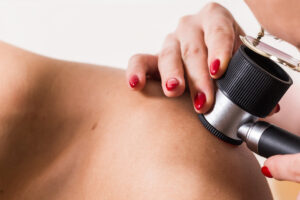Skin Cancer Of The Hand And Upper Extremity
If you suffer from skin cancer of the hand and upper extremity, please Schedule an appointment with one of our orthopedic specialists as soon as possible.
What Is Skin Cancer Of The Hand And Upper Extremity?

Skin cancer affecting the hand and upper extremity denotes the growth of cancerous cells in the skin of the hand, wrist, and forearm. Moreover, it can impact different skin layers, including the epidermis, dermis, and subcutaneous tissue.
Furthermore, basal cell carcinoma, squamous cell carcinoma, and melanoma are prevalent types of skin cancer that may arise in the hand and upper extremities. These cancers commonly emerge due to prolonged sun exposure and cumulative UV radiation damage. Additionally, other factors like genetic predisposition or a prior history of skin cancer can cause this condition.
Indications Of Skin Cancer Of The Hand And Upper Extremity?
Treatments For Skin Cancer Of The Hand And Upper Extremity
However, treatment options for skin cancer in the hand and upper extremities hinge on factors like the type, stage, and location of the cancer. Additionally, treatment plans may include, surgical removal of the cancerous tissue, wide local excision, or Mohs surgery for specific skin cancer types. In some cases, additional treatment modalities such as radiation therapy, topical chemotherapy, or immunotherapy may be considered.
Moreover, early detection and timely treatment play crucial roles in achieving favorable outcomes in skin cancer. Regular self-examination of the skin, particularly in sun-exposed areas like the hands and arms, can help mitigate the risk of skin cancer development. In addition, adherence to sun protection practices such as sunscreen application and wearing protective clothing plays a beneficial role. Consulting with a healthcare professional for proper evaluation or concerning skin changes is strongly recommended.

